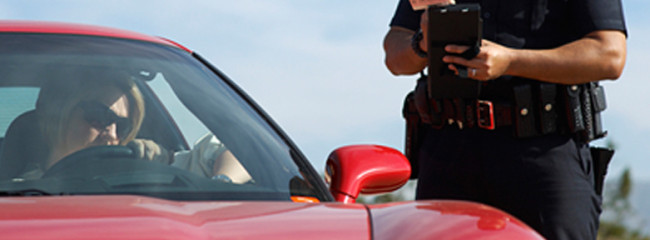“BAD COP… NO DOUGHNUT.” Supreme Court of the United States*
New Castle Delaware, 1976. A police officer decided to stop a car. No traffic law had been broken. No equipment violations were visible. But the driver, Mr. Prouse, was in for a bad day. At the pre-trial suppression hearing, the officer testified:
“I saw the car in the area and wasn’t answering any complaints, so I decided to pull them off”. (Phrasing!)
The officer admitted he was not acting pursuant to any department standards or procedures. For no particular reason, he wanted to check the driver’s license. He didn’t fess up to any other motivation.
The testimony showed the officer smelled pot as he walked up to the car. There was marihuana in plain view on car’s floor. Mr. Prouse was arrested for possession. Is it just me, or are you flashing on a scene from Cheech & Chong’s movie, “Up In Smoke” (1978)?
The trial court granted Mr. Prouse’s motion to suppress the pot. Given only the explanation the officer had nothing else to do, and couldn’t give any other reason for stopping Mr. Prouse, the court found the stop & detention was “wholly capricious”. The Delaware Supreme Court agreed. But the prosecution wasn’t done losing. They brought the case to the Supreme Court of the United States (SCOTUS). The country’s highest court agreed with all the lower courts. The stop was bad, and the pot was inadmissible.
Give the history of 4th Amendment cases up to 1979, the prosecution’s tenacity seems misplaced. Eight years prior to Mr. Prouse’s meeting with the bored Delaware cop, the SCOTUS wrote Terry v. Ohio, 392 US 1 (1968). The ruling left no doubt: police needed “reasonable suspicion” to stop a citizen. “Reasonable suspicion” to stop is a lower standard than “probable cause” to arrest. Still, something articulable is needed to suspect there might be a violation of the law.
In Terry, the Supreme Court warned against stopping autos “…on nothing more substantial than inarticulate hunches…”. Re-read the Delaware officer’s quote. It doesn’t even rise to the level of a hunch. It was more of a, “I felt like it.”.
The State of Delaware wanted SCOTUS to agree police should be “…subject to no constraints in deciding which automobiles should be stopped for a license and registration check…”. None. Traffic violations & equipment issues not required. Safety concerns should trump the loss of liberty suffered by citizens and outweigh privacy concerns. Imagine living in a county in which the police can stop anyone just because….
Delaware wanted the police to be able to stop any car for no other reason than furthering the cause of checking drivers’ papers. Now, doesn’t that have an eerie ring? I had opened this blog with, “It was a different world in 1976”. I cut the sentence after a bit of thought.
The SCOTUS decision was written by Justice White. He followed the path already established by the high court in Terry.
“[W]e hold that except in those situations in which there is at least articulable and reasonable suspicion that a motorist is unlicensed or that an automobile is not registered, or that either the vehicle or an occupant is otherwise subject to seizure for violation of law, stopping an automobile and detaining the driver in order to check his driver’s license and the registration of the automobile are unreasonable under the Fourth Amendment.”
Delaware v. Prouse, 440 US 648 (1979) (emphasis added)
Plainly stated, the police need a reason to stop you. Baseless hunches need not apply. And capriciousness? That is right out. I’ve had clients report to me being told by officers that they were stopped for no particular reason. Just routine. Unless it is a road block run in a uniform way, there is no “routine” allowed. If you respectfully mention “Delaware v. Prouse”, they should recognize the name from the academy.
Coming soon….More on how to deal with a traffic stop.
* Well, ok….they didn’t really say that. But they should have. I bet Justice White was thinking it.


Clear and concise explanation of the legal requirements for police to stop an automobile. Carport Venice FL
Reply夢巴黎春藥網:https://pariss88.com/
女性催情春藥:https://pariss88.com/product-category/aphrodisiac/
女性迷幻春藥:https://pariss88.com/product-category/psychedelic/
印度正品代購:https://pariss88.com/product-category/medicine/
男性壯陽補腎:https://pariss88.com/product-category/kidney/
陰莖增大增粗:https://pariss88.com/product-category/thicken/
GB系列春藥:https://pariss88.com/product-category/aroused/
所有春藥商品:https://pariss88.com/shop/
春藥資訊:https://pariss88.com/blog/
關於我們:https://pariss88.com/about-us
Reply春藥對女性性慾望的顯著增強作用!
春藥是最受歡迎的女性催情藥物,讓愛火重燃的秘密武器!
春藥是什麼?揭開女性催情藥的神秘面紗
春藥如何影響女性性反應?揭開春藥的實際效果
春藥會讓人上癮嗎?揭開女性催情藥的真實效果與安全性
春藥效果解析:提升女性性慾與性愛滿意度的秘密武器
春藥對女性身體的深層影響:從血液循環到極致快感的全面解析
春藥的效果與作用:提升女性性慾望與性滿意度
春藥效果與作用全面解析:激發女性性慾與改善性冷淡
春藥是激發女性性慾望及提升性高潮快感的秘密武器
春藥的催情效果全解析:讓性愛更激情性高潮更猛烈
春藥效果大揭密:找回激情性愛的秘密武器!
女性服用春藥後的真實反應:從羞澀到淫蕩發騷的轉變
春藥如何幫助女性體驗激情性愛:全面指南
春藥:點燃女性激情,體驗極致性愛享受的秘訣
春藥如何通過刺激女性荷爾蒙來增強性快感?
春藥如何幫助女性找回激情性愛,享受極致快感?
春藥如何激發女性淫蕩慾望,讓女性主動求愛的?
春藥在兩性關係中起到哪些作用?解析春藥的效果
春藥在性愛中的關鍵作用:釋放女性淫蕩慾望
春藥如何讓女性淫蕩發情主動求歡:全面解析春藥效果
春藥如何幫助女性重燃性愛激情體驗美妙性高潮?
春藥的神奇效果:從淑女到淫蕩發騷的轉變
春藥的催情效果:讓女性在性愛中欲仙欲死的極致體驗
春藥的效果:激發女性性慾望的深度解析
春藥番外篇:天然春藥與合成春藥的效果對比
Reply春藥
媚藥
催情春藥
催情藥
女性春藥
春藥哪裡買
春藥推薦
春藥是什麼
春藥水
有效春藥
正品春藥
無色無味的春藥
網購春藥
進口春藥
女性媚藥
日本媚藥
日本春藥
春藥真的有用嗎
春藥有副作用嗎
催淫春藥
春藥膠囊
粉狀春藥
液體春藥
昏睡春藥
迷情春藥
迷幻春藥
催眠春藥
口交水
聽話水
乖乖水
失憶水
催情水
迷姦水
迷姦藥
迷幻藥
高潮液
催情液
春藥粉
女性發騷水
淫蕩發騷春藥
女性催淫春藥
激發女性性慾
增強性快感
增加女性主動
增加女性分泌物
增加女性敏感度
治療女性性冷淡
誘發女性性渴望
事後無記憶
迷幻催情春藥
昏睡失憶春藥
強效催情春藥
女性淫蕩發騷
女性催情膠囊
無副作用春藥
女性潮吹春藥
男女通用型春藥
催情口服液
無色無味的春藥
催情春藥水
女性催情媚藥
昏睡迷姦春藥
無色無味春藥水
超強淫蕩媚藥
女性外用春藥
刺激陰蒂快感
女性催情高潮液
女性私處高潮液
女性高潮潤滑劑
女用催淫凝膠
強效催情凝膠
發騷春藥凝膠
Reply